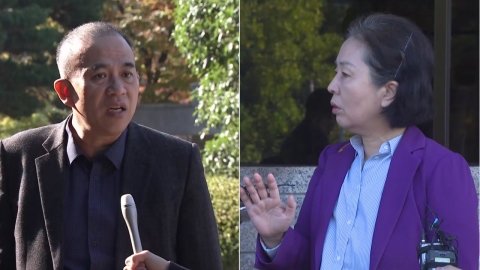The domestic stock market continues to fluctuate in the aftermath of the emergency martial law.The KOSPI index fell more than 2% at one point during the day amid the repeated rise and fall of the
won-dollar exchange rate.
I'm connecting with a reporter to find out. Reporter Hwang Bo Hye-kyung!
[Reporter]
Yes, I'm at Hana Bank's foreign exchange transaction site.
[Anchor]
How is the won-dollar exchange rate and the stock market now?
[Reporter]
Foreign currency dealers here are also busy in the aftermath of the sharp rise in the won-dollar exchange rate overnight.
The exchange rate, which once exceeded 1,440 won, is now moving around 1,410 won.
Compared to right after martial law was declared, it has calmed down, but it is still uneasy, repeating the rise and fall.
The local stock market opened normally, but both the KOSPI and KOSDAQ started lower.
The KOSPI opened 1.97 percent lower at 2,450.76 and the tech-heavy KOSDAQ index closed 1.91 percent lower at 677.59.
Currently, the KOSPI is around 2,450 and the KOSDAQ is down around 2% to the early 670 level.
In the KOSPI market, foreigners sold nearly 400 billion won, leading the decline, falling more than 2% at one point during the day, breaking the 2,450 level.
[Anchor]
The financial authorities continue to come up with countermeasures, right?
[Reporter]
Financial authorities assess that the market is gradually stabilizing, but are wary of expanding volatility.
We are making all-out efforts to stabilize the market by providing unlimited liquidity until the financial market is fully normalized.
Kim Byung-hwan, chairman of the Financial Services Commission, said he will prepare the stock market stabilization fund worth 10 trillion won to operate immediately at any time.
In addition, it added that it will make maximum use of 40 trillion won bond market stabilization funds, corporate bonds, and CP purchase programs.
BOK has started buying repurchase bonds, RP to provide short-term funds to the market.
The policy is to support liquidity by holding financial company securities as collateral.
Deputy Prime Minister for Economic Affairs Choi Sang-mok held an emergency meeting of economy-related ministers this morning and said he would operate the TF 24 hours a day to ensure that there was no real economic shock and that exports would not be disrupted.
However, it is predicted that the outflow of foreign funds and the weakening of the won will continue for the time being amid political instability.
In addition, there are growing concerns that the impact on the external credibility of the Korean economy is inevitable.
So far, I'm YTN Hwang Bo Hye-kyung at Hana Bank's foreign exchange transaction site.
※ 'Your report becomes news'
[Kakao Talk] YTN Search and Add Channel
[Phone] 02-398-8585
[Mail] social@ytn.co.kr
[Copyright holder (c) YTN Unauthorized reproduction, redistribution and use of AI data prohibited]
Economy
More- Railway union negotiations break down...We're going on strike from the first train today.
- The railway union is going on strike tomorrow...It's inevitable that it's going to disrupt my way to work.
- Convenience store daily necessities 'sparkling up' after martial law announcement..."It's stable now".
- Naver News Access to Martial Law Hits Highest Ever Record
![[Breaking News] Minjoo is "very sorry" for ruling party's plan to reject 'impeachment'](https://www.ytn.co.kr/img/news/default_img.jpg)








